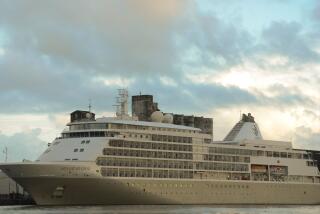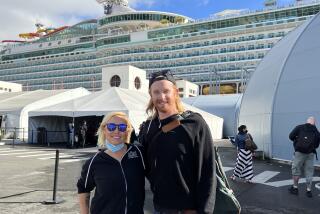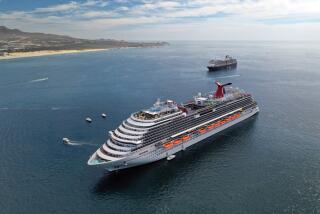An L.A. couple is trapped on a coronavirus-stricken cruise ship with nowhere to dock
Fearing the coronavirus, the children of a Los Angeles couple are pleading for help for their elderly parents aboard the Zaandam, a cruise ship heading to Florida and trying to dock.
Shou-Yinn Cheng and her husband, Min-Lee Cheng, started their two-week South American trip March 8, departing from Buenos Aires with 10 friends, half of them from California. They snapped pictures at the breathtaking Iguazu Falls, spanning the border of Argentina and Brazil. They posed with penguins and spent evenings in the splendor of the ship’s dining hall. Their comfortable, elegant vessel, built in Italy, was designed to house as many as 1,432 guests.
But days into their trip, travelers began to hear about people falling ill with symptoms of COVID-19, the disease caused by the novel coronavirus.
After exploring Chile’s Punta Arenas along the coast, Min-Lee Cheng, 72, feeling feverish, went to consult with the ship’s staff. He was surprised to find the medical center packed — and soon, as the global pandemic halted markets and activities worldwide — officials on the Zaandam urged all passengers to self-quarantine.
On board, four people would die of COVID-19.
Nine people have tested positive for the disease so far, according to Erik Elvejord, spokesman for Holland America Line, the cruise line.
Back home in Southern California, the couple’s sons, Jih-Fei and Jih-Hao Cheng, panicked. They began to call City Council members in La Habra Heights, where their parents live, along with elected leaders in Los Angeles, Sacramento and Washington, seeking to publicize the plight of more than 1,000 travelers and crew members captive on a ship denied entry at port after port.
“We must get them off, everyone. Catching this disease — that is the absolute primary concern,” said Jih-Hao Cheng, a regional director for a sporting goods company from Fullerton. “They’re in a petri dish, and the risk of them contracting the virus is incredibly high. They told me their next-door neighbor has been coughing and coughing nonstop night and day. And you know the thin wall that separates them. I’ve requested that they be moved, but I understand how the staff is overwhelmed.”
Even with spotty Wi-Fi, Jih-Hao Cheng and his older brother tried to stay in constant contact with their parents who are barely eating or sleeping.
Their father believes he may have gastritis. He asked to be tested for COVID-19, but without respiratory issues, doctors turned him away.
Crew members have separated the passengers; those who have had no illness have been transferred to the Rotterdam, another ship owned by Holland America.
The Zaandam and Rotterdam are sailing in tandem, carrying the deceased and two people in dire need of medical evacuation, possibly to Mexico. The ships are destined for Florida’s Port Everglades, where Broward County officials, along with the U.S. Coast Guard, have demanded a plan “for self-support of the medical issues occurring on board the vessels.”
Florida Gov. Ron DeSantis, in an interview with Fox News, said that “we cannot afford to have people who are not even Floridians dumped into South Florida using up those valuable resources.”
Elvejord said company representatives have “requested and were denied to disembark in Chile, Peru, Ecuador, Panama.”
Officials in Panama, however, allowed the ships to pass through its canal and, before that crossing, gave permission for crew members to transfer supplies between the two vessels.
Crew members also were permitted to bring provisions and medication on the vessels in Chile.
There are 797 guests and 645 crew members on the Rotterdam; 446 guests and 602 crew members are on the Zaandam, according to Elvejord, who added that the company “will certainly provide the information” that Florida officials are requesting.
Meanwhile, with each day blurring into the next, “we are not on a regular clock or routine anymore,” said Min-Lee Cheng, a retired public health official and expert on diseases transmitted via mosquitoes.
Jih-Fei Cheng, a Scripps College professor, said his father’s medical background helped him to “stay calmer. But we are all fearful. Can you imagine them watching from their room as most of their friends boarded the Rotterdam while they were asked to stay behind? They heard that those friends have reserved flights that will take them home — as soon as they are allowed to disembark — while what will happen to them?”
He said it surprised him that people were criticized about going on cruises, adding that “when my parents flew out of Los Angeles … they were under the impression that there were very few cases in South America. None of us knew how huge this would be. Early intervention would have prevented all of this trouble. The longer we wait, the harder it will be to resolve.”
Min-Lee Cheng said “the biggest challenge is the uncertainty. We are not given current information on board the ship. We only found out this morning there are people who have tested positive for COVID-19.”
More to Read
Sign up for Essential California
The most important California stories and recommendations in your inbox every morning.
You may occasionally receive promotional content from the Los Angeles Times.











